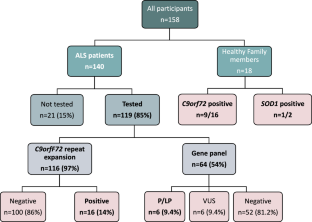Journal of Neurology ( IF 6 ) Pub Date : 2024-04-16 , DOI: 10.1007/s00415-024-12368-3 Dalit Barel , Daphna Marom , Penina Ponger , Alina Kurolap , Anat Bar-Shira , Idit Kaplan-Ber , Adi Mory , Beatrice Abramovich , Yuval Yaron , Vivian Drory , Hagit Baris Feldman

|
Amyotrophic lateral sclerosis (ALS) is a progressive neurodegenerative disorder. It is mostly sporadic, with the C9orf72 repeat expansion being the most common genetic cause. While the prevalence of C9orf72-ALS in patients from different populations has been studied, data regarding the yield of C9orf72 compared to an ALS gene panel testing is limited.
We aimed to explore the application of C9orf72 versus a gene panel in the general Israeli population. A total of 140 ALS patients attended our Neurogenetics Clinic throughout 2018–2023. Disease onset was between ages 60 and 69 years for most patients (34%); however, a quarter had an early-onset disease (< 50 years). Overall, 119 patients (85%) were genetically evaluated: 116 (97%) were tested for the C9orf72 repeat expansion and 64 (54%) underwent gene panel testing. The C9orf72 repeat expansion had a prevalence of 21% among Ashkenazi Jewish patients compared to 5.7% in non-Ashkenazi patients, while the gene panel had a higher yield in non-Ashkenazi patients with 14% disease-causing variants compared to 5.7% in Ashkenazi Jews. Among early-onset ALS patients, panel testing was positive in 12% compared to 2.9% for C9orf72.
We suggest a testing strategy for the Israeli ALS patients: C9orf72 should be the first-tier test in Ashkenazi Jewish patients, while a gene panel should be considered as the first step in non-Ashkenazi and early-onset patients. Tiered testing has important implications for patient management, including prognosis, ongoing clinical trials, and prevention in future generations. Similar studies should be implemented worldwide to uncover the diverse ALS genetic architecture and facilitate tailored care.
中文翻译:

使用 C9orf72 重复扩增和多基因组对肌萎缩侧索硬化症进行基因诊断和检出率
肌萎缩侧索硬化症(ALS)是一种进行性神经退行性疾病。它大多是散发性的,其中C9orf72重复扩增是最常见的遗传原因。虽然已经研究了来自不同人群的患者中C9orf72 -ALS的患病率,但与 ALS 基因组测试相比,有关C9orf72产量的数据有限。
我们的目的是探索C9orf72与基因组在以色列普通人群中的应用。 2018 年至 2023 年期间,共有 140 名 ALS 患者到我们的神经遗传学诊所就诊。大多数患者 (34%) 发病年龄在 60 至 69 岁之间;然而,四分之一的人患有早发性疾病(< 50 岁)。总体而言,对 119 名患者 (85%) 进行了基因评估:116 名患者 (97%) 接受了C9orf72重复扩增测试,64 名患者 (54%) 接受了基因面板测试。 C9orf72重复扩增在德系犹太人患者中的患病率为 21%,而在非德系犹太人患者中为 5.7%,而基因组在非德系犹太人患者中的产量较高,致病变异为 14%,而在德系犹太人中为 5.7%。犹太人。在早发 ALS 患者中,12% 的群体检测呈阳性,而C9orf72 的阳性率为 2.9% 。
我们建议针对以色列 ALS 患者的检测策略:C9orf72应作为德系犹太人患者的首要检测,而基因组应被视为非德系犹太人和早发患者的第一步。分层测试对患者管理具有重要意义,包括预后、正在进行的临床试验和子孙后代的预防。类似的研究应该在世界范围内开展,以揭示不同的 ALS 遗传结构并促进量身定制的护理。



























 京公网安备 11010802027423号
京公网安备 11010802027423号